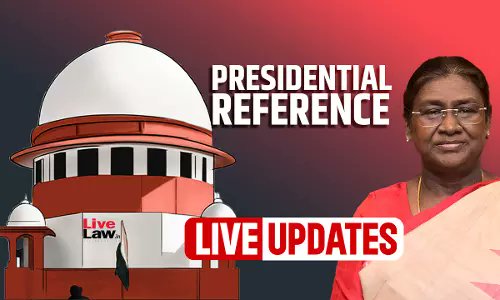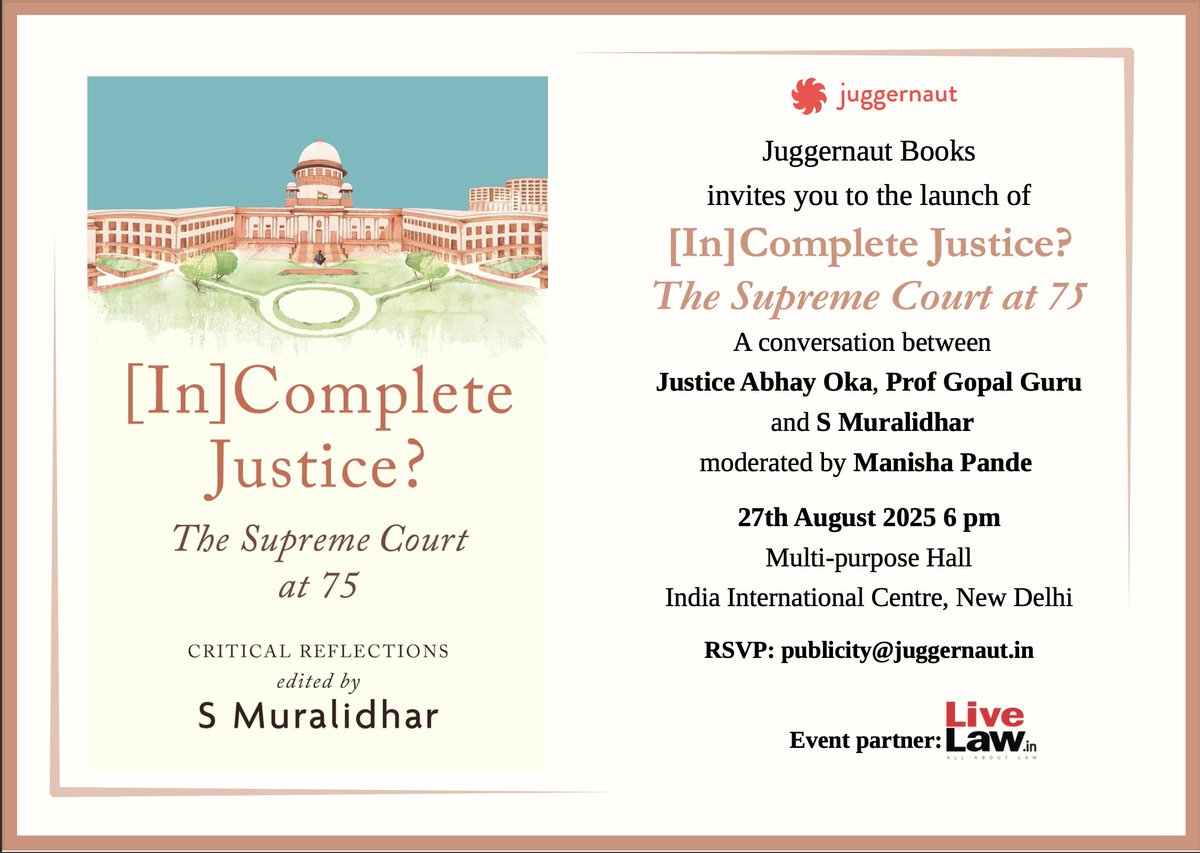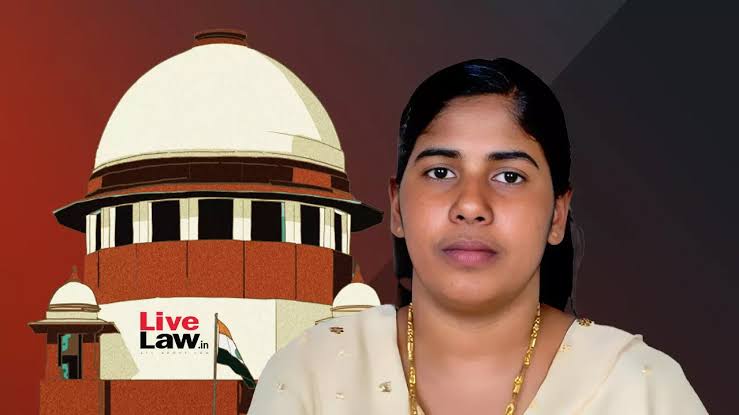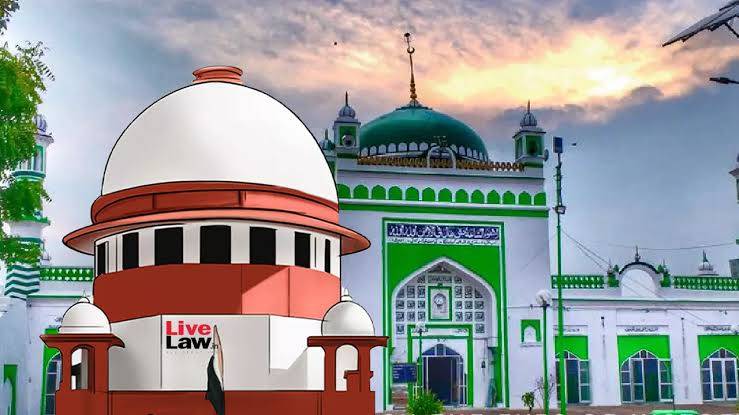#SupremeCourt constitution bench to continue hearing today Presidential Reference by President Droupadi Murmu(@rashtrapatibhvn) on 14 questions on the power to assent on Bills, including whether Court can fix timelines for the President/Governor to decide on Bills. 
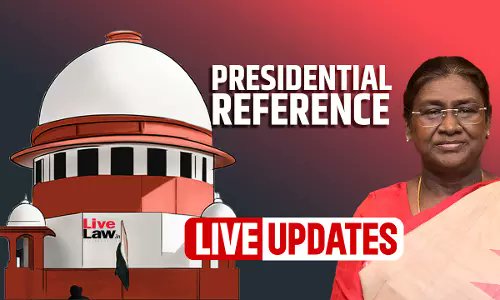
@rashtrapatibhvn The Presidential Reference, made under Article 143, came a month after Supreme Court's judgment in Tamil Nadu Governor's matter, wherein the Court held that the Governor did not act bona fide in reserving Bills to President. It held those bills as deemed assented.
@rashtrapatibhvn In the judgment passed by Justices JB Pardiwala and R Mahadevan, the Court held that the President must act on the Bills reserved for her under Article 201 within 3 months: livelaw.in/top-stories/pr…
@rashtrapatibhvn A Presidential Reference is heard by a constitution bench and therefore, a five-judge bench: 
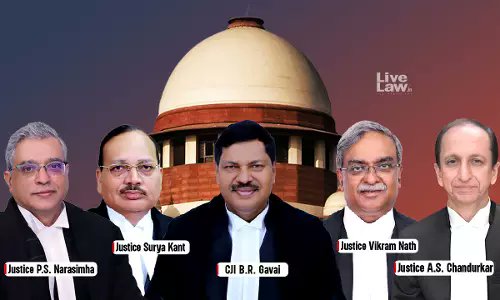
@rashtrapatibhvn Senior Advocates NK Kaul and Maninder Singh will continue their arguments today.
@rashtrapatibhvn The arguments of the parties in favour of the reference will be concluded today. The parties opposing the reference will begin their arguments on August 28.
Kaul: I have concluded on Article 200- very briefly, I will recap. I said, three clear options in the main part- says shall declare. Each has finality. Withhold means bill falls, assent means bill becomes law. Proviso is in nature of preliminary option, a consultative process.
They argued last of proviso says shall not withhold assent, it necessary means its adjunct to withhold- that is not what is textually given.
Returning was distinct option given under the Government of India Act. Does discretion exist in Articles 200 and 201? Repeated judgments say decision will be made irrespective of the advice of the council...as said in Shamsher Singh and BK Pavitra follows.
They argued last of proviso says shall not withhold assent, it necessary means its adjunct to withhold- that is not what is textually given.
Returning was distinct option given under the Government of India Act. Does discretion exist in Articles 200 and 201? Repeated judgments say decision will be made irrespective of the advice of the council...as said in Shamsher Singh and BK Pavitra follows.
Kaul: it is sought to be argued that discretion is not an independent option- please have Article 167(duties of Chief Minister to furnish information)-even with regard to this Article- it was asked why does Governor need information? Dr Ambedkar say, the Governor duty is that he must get information but it is his duty to advise, reconsider and recommendation. He is not a representative of political party but the will of the state
CJI: he is a vital link between central and State Government
Kaul: memorandum of information on repugnancy, etc is asked and then application of mind takes place- that's why irrespective of aid and advise of Council
CJI: second time council of ministers reiterates the Bill, the Governor can still exercise discretion?
Kaul: no, the constitution is clear because he now can't withhold assent. What I am saying, discretion exercised by Governor or President means an indepedent exercise of discretion; he is a part of the legislative component.
CJI: he is a vital link between central and State Government
Kaul: memorandum of information on repugnancy, etc is asked and then application of mind takes place- that's why irrespective of aid and advise of Council
CJI: second time council of ministers reiterates the Bill, the Governor can still exercise discretion?
Kaul: no, the constitution is clear because he now can't withhold assent. What I am saying, discretion exercised by Governor or President means an indepedent exercise of discretion; he is a part of the legislative component.
Kaul: his right to withhold in main part is indepedent discretion. Second argument is, independent exercise of judgment and discretion. BK Pavitra, issue arose when Governor refers to President, should there be grounds in which he refers it? It was answered that framers assuaged defining circumstances, you can't put it in straightjacket formula, it has to be left to his discretion.
@rashtrapatibhvn Kaul: mylords pointed out Article 163, the discretion could be implicit or explicit. In Shivraj Chauhan, mylords said the House is summoned on aid and advise but when confidence of house is lost, then that's an independent view in regards to Article 74.
Kaul: on timelines- Purushothaman Nambudiri, the issue was does Bill lapse with assembly with life of assembly ends? it was said, no because there is no timeline. Where timeline is required to be provided, it is categorically provided.
CJI: Attorney has argued this
Kaul: Memorandum of information is concerned, it is impossible to say the Governor or President will decide in some specific time, given the complexity.
On judicial review-your lordship have held judicial review power is implicit in written Constitution- but mylords have from AK Kaul downwards have held, as a facet of judicial review is justiciability. Both are different.
CJI: Attorney has argued this
Kaul: Memorandum of information is concerned, it is impossible to say the Governor or President will decide in some specific time, given the complexity.
On judicial review-your lordship have held judicial review power is implicit in written Constitution- but mylords have from AK Kaul downwards have held, as a facet of judicial review is justiciability. Both are different.
@rashtrapatibhvn Kaul: action of judicial review is always tested on touchstone of Constitution. when there are no justiciable manageable standards to judge an action, the action is not susceptible to judicial process.
Kaul: they are incapable of being adjudicated. It requires objective criteria- there is operative complexity- consultation with ministers, etc- this can't be compared to exercise of powers under Article 356. It is sui generis. Under Article 356, there is failure of constitutional machinery and there is a report of the Governor- the court felt this is subjected to judicial review.
CJI: If discretion under Article 356 is justiciable, why not under Article 200?
Kaul: there are a lot of complexity involving constitutional concern, inter-se relationships etc- mylords have categorically held that assent by President is not justiciable because there is no legally manageable standards. Argument can't be what happens when Governor sits on bill indefinitely?
CJI: If discretion under Article 356 is justiciable, why not under Article 200?
Kaul: there are a lot of complexity involving constitutional concern, inter-se relationships etc- mylords have categorically held that assent by President is not justiciable because there is no legally manageable standards. Argument can't be what happens when Governor sits on bill indefinitely?
Kaul: the constitution has trusted their judgment in the matter- the starting point can't be there is a misuse. Mylords have said on many issue that it is for the Parliament to take a call. If situation arises of egregious conduct, the Parliament has to take care- the answer can't be to lay down timeline and say it is judicially reviewable.
CJI: Both houses of legislature have given approval on two occasions, why President/Governor sit on it for an indefinite period of time? We appreciate that we can't fix timetable, but if someone sits will the court be powerless? we understand that abuse of powers, when constitutional functionaries are involved, should not be assumed by the court, we appreciate the submission.
Kaul: this is an area best left to the Parliament to decide. Mylords have said it is for the Parliament to take a call.
Kaul: this is an area best left to the Parliament to decide. Mylords have said it is for the Parliament to take a call.
@rashtrapatibhvn Kaul: interpretation which completely rewrites the Constitution- the starting point of the debate can't be there is a vacuum and someone will misuse and therefore, as a constitutional court will be set it right.
@rashtrapatibhvn Kaul: on deemed assent- this is completely impermissible-judicial relocation of constitutional functions.
seeking opinion of SC- judgment/opinion of the President not justiciable- not an ideal formality.
seeking opinion of SC- judgment/opinion of the President not justiciable- not an ideal formality.
Sr Adv Harish Salve (for Maharashtra): What is the nuanced which I process? in my submission, we have to be careful to not put the cart before the horse- we are a constitutional construct resembling federalism. Do we look at our constitution to see who it is created or intepret provisions linked to union and states with prior notion that it is understood to make some notion on federalism. Framers have created have a system where Union can refuse a Bill passed by assembly what is uncharitably characterised as veto. It exists, unless we rewrite Article 201
CJI: Union can reject bill passed by State legislature?
Salve: yes, plain from language of proviso to Article 201. Entire exercise of trying to avoid a veto like power overlooks that the language of Article 201 does not admit of any such limitation. If that is the starting point of debate and we give up notion that finding veto is antithetical or erodes the constitution, we come to different conclusions.
CJI: Union can reject bill passed by State legislature?
Salve: yes, plain from language of proviso to Article 201. Entire exercise of trying to avoid a veto like power overlooks that the language of Article 201 does not admit of any such limitation. If that is the starting point of debate and we give up notion that finding veto is antithetical or erodes the constitution, we come to different conclusions.
Salve: If veto is not anathema to the constitutional scheme, then let us start without any preconceived notion seeing what language of Article 200 leads to.
CJI: Governor has veto to withhold assent?
Salve: it would be unchartiably characterised as veto, better to say he has power of withholding. Veto is something we use for personal interest that's why uncharitably characterised.
What defines our federalism? marked difference in scheme of Union and President as against legislative provisions relating to States.
CJI: Union has right to reject a bill by legislature? can that be exercised for list II? even if there is no repugnancy?
Salve: yes, Article 201 has no limitation. 254(2) is a different matter
CJI: What happens to Union reserved for List I, State for List II?
Salve: that is Article 254(4)
CJI: Governor has veto to withhold assent?
Salve: it would be unchartiably characterised as veto, better to say he has power of withholding. Veto is something we use for personal interest that's why uncharitably characterised.
What defines our federalism? marked difference in scheme of Union and President as against legislative provisions relating to States.
CJI: Union has right to reject a bill by legislature? can that be exercised for list II? even if there is no repugnancy?
Salve: yes, Article 201 has no limitation. 254(2) is a different matter
CJI: What happens to Union reserved for List I, State for List II?
Salve: that is Article 254(4)
CJI: we understand it as constitutional harmony
Salve: we don't start with any preconceived notion. I don't propose to read any judgment, just read the Article. If Article 201 is picked up, mylords have been told repeatedly, each words are carefully calibrated.
marked the words -shall be presented against to the President- the words shall not withhold assent is conspicuous- high constitutional functionaries...
CJI: Dr Ambedkar said how federalism works and how the scheme is different...he said, except emergency, the States would work under spheres allotted to them, and Union likewise and except for emergency where powers stands with centre unitedly.
Salve: understanding of Articles 200 and 201 has become legislative competence-centric. The state legislatures are legislatures who have the right to make laws. In our federalism, two parallel models- Union and State legislature. Constitution treats them differently, and we can't read it differently. For eg, Article 74.
Salve: we don't start with any preconceived notion. I don't propose to read any judgment, just read the Article. If Article 201 is picked up, mylords have been told repeatedly, each words are carefully calibrated.
marked the words -shall be presented against to the President- the words shall not withhold assent is conspicuous- high constitutional functionaries...
CJI: Dr Ambedkar said how federalism works and how the scheme is different...he said, except emergency, the States would work under spheres allotted to them, and Union likewise and except for emergency where powers stands with centre unitedly.
Salve: understanding of Articles 200 and 201 has become legislative competence-centric. The state legislatures are legislatures who have the right to make laws. In our federalism, two parallel models- Union and State legislature. Constitution treats them differently, and we can't read it differently. For eg, Article 74.
Salve: We have legislative procedure in Part V, this culminates in Article 111- assent is the last step in legislative procedure [Reads Article 111]. There is no further question of referring the bill. This Article would have different connotation had Article 74 not being there because all functions can't be without aid and advise.
@rashtrapatibhvn Salva: Article 74 is untrammelled- we don't have discretion powers of President. This distinction is characterised in federalism.
Salve: by itself, there is no disharmony between the two provisions. What is our federalism is that there provisions provide.
J Narasimha: issue is not so much about withholding, occuring by virtue of Article 201 proviso, President by virtue says Bill will be represented, we are not on that issue. We are on Article 200 and proviso, Union says power of withholding stands on its own. Independently exercise withholding, it gives rise to four option/or adjunct to second option, that aspect is problematic- threshold if Governor withholds, textually that is a problem because even Money Bill be can withhold. Assume if substantive provision can be read with proviso, at second stage the Governor can send it to President, which TN says it can't and only when it is send to President under Article 201, the procedure will begin.
J Narasimha: issue is not so much about withholding, occuring by virtue of Article 201 proviso, President by virtue says Bill will be represented, we are not on that issue. We are on Article 200 and proviso, Union says power of withholding stands on its own. Independently exercise withholding, it gives rise to four option/or adjunct to second option, that aspect is problematic- threshold if Governor withholds, textually that is a problem because even Money Bill be can withhold. Assume if substantive provision can be read with proviso, at second stage the Governor can send it to President, which TN says it can't and only when it is send to President under Article 201, the procedure will begin.
Salve: it arises because of the preconceived consequence of reading the powers. Article 200 language is plain, but that means that he can...
J Narasimha: how do you understand the proviso not occuring in substantive, that why even Money bill can be straighway withheld.
Salve: yes, he can. Let's put proviso to one side. Look it in reverse- without any preconceived notion. Article 200 is untrammelled If framers knew that there is separate class of legislation called Money Bill, all they had to do is...we are doing is picking up words and adding because we feel there should be some limitation.
Look at proviso, one of the three options is limited- Governor under duty to make a declaration, the plain language says- the governor shall declare! he has to make a declaration- assents to the bill/withholds assent therefrom/or reserves for President. Then, fourth option, he returns with a message to assembly. Fourth is being used to...the first option. These are high constitutional functionaries enacting legislation.
J Narasimha: how do you understand the proviso not occuring in substantive, that why even Money bill can be straighway withheld.
Salve: yes, he can. Let's put proviso to one side. Look it in reverse- without any preconceived notion. Article 200 is untrammelled If framers knew that there is separate class of legislation called Money Bill, all they had to do is...we are doing is picking up words and adding because we feel there should be some limitation.
Look at proviso, one of the three options is limited- Governor under duty to make a declaration, the plain language says- the governor shall declare! he has to make a declaration- assents to the bill/withholds assent therefrom/or reserves for President. Then, fourth option, he returns with a message to assembly. Fourth is being used to...the first option. These are high constitutional functionaries enacting legislation.
@rashtrapatibhvn Salve: the proviso, if interpreting or reading it to the main part is correct, it would have used 'shall'. For same constitutional functionary, he uses both may and shall.
J Narasimha: how do you reconcile that money bill be rejected at the outset by the Governor by substantive provision and in proviso again he has the option
Salve: yes
SG Mehta: Article 207 is the answer, there is no question of withholding
J Narasimha: therefore your argument that he can withhold the money bill goes
SG: there is no question because the money bill has to be introduced on recommendation of the Governor
Salve: there may be a third situation-money bill is introduced by Governor, Bill may undergo changes, if what is approved does not accord with Governor, he can withhold.
Salve: yes
SG Mehta: Article 207 is the answer, there is no question of withholding
J Narasimha: therefore your argument that he can withhold the money bill goes
SG: there is no question because the money bill has to be introduced on recommendation of the Governor
Salve: there may be a third situation-money bill is introduced by Governor, Bill may undergo changes, if what is approved does not accord with Governor, he can withhold.
J Narasimha: we are not on abuse of power but on interpetation
CJI: while deciding the matter, we will not look at the Tamil Nadu matter.
Salve: Article 200 in the fourth option, removes money bill because that has been done. Despite that, if money bill is passed as recommended by Governor is not accepted, nothing withhold him from withholding assent. If fourth option does not accommodate money bill because it is introduced with recommendation of Governor. Proviso is introduced for recognising the consensus that the Governor is trusting the wisdom of the assembly.
CJI: while deciding the matter, we will not look at the Tamil Nadu matter.
Salve: Article 200 in the fourth option, removes money bill because that has been done. Despite that, if money bill is passed as recommended by Governor is not accepted, nothing withhold him from withholding assent. If fourth option does not accommodate money bill because it is introduced with recommendation of Governor. Proviso is introduced for recognising the consensus that the Governor is trusting the wisdom of the assembly.
Salve:because you are creating a veto- word veto does not fit in our constitutional debate. What we are saying, the power of this high constitutional functionary may extent to stemming a bill because that is quite consistent with scheme of Article 201.
If Governor sends back and it comes back, two out of four is ruled out. he can then either grant assent or reserves for President.
If Governor sends back and it comes back, two out of four is ruled out. he can then either grant assent or reserves for President.
Salve: Governor is nodal agency for harmony between union and States. In real constitutional scheme, it is hard to believe that the Governor will act on his own, he may refer to President or try working with Assembly. It is hard to believe that assent must follow and assembly must have the last word- if that is not the scheme of the Indian Constitution, we have to go back to the drawning board and decide what is our federalism.
@rashtrapatibhvn J Narasimha: Article 111- President withholds without application of proviso
Salve: Article 74(2) will come into play
Salve: Article 74(2) will come into play
@rashtrapatibhvn J Narasimha: how Article 74(2)?
Salve: I misunderstood, Article 74(1); there is an element of political process recognised.
Salve: I misunderstood, Article 74(1); there is an element of political process recognised.
Salve: When it is presented to the President, he has to act on aid and advise
CJI: though President is bound by aid and advise, its for for so far the States are concerned and the Governor can
Salve: yes; we have two structure and the constitutional framers could have decided, but they did create two structures. Textually, when they wanted to make it 'shall' they did, very carefully crafted provision. The general refer that may becomes shall, they will not apply here because where they wanted, shall is used. On textual interpretation, scheme of Article 200 does not make withholding assent as necessary reference to returning the Bill.
CJI: though President is bound by aid and advise, its for for so far the States are concerned and the Governor can
Salve: yes; we have two structure and the constitutional framers could have decided, but they did create two structures. Textually, when they wanted to make it 'shall' they did, very carefully crafted provision. The general refer that may becomes shall, they will not apply here because where they wanted, shall is used. On textual interpretation, scheme of Article 200 does not make withholding assent as necessary reference to returning the Bill.
@rashtrapatibhvn Salve: Article 200 does not set out time limit under which the Governor has to set out his discretion- political process takes place behind the scheme, we achieve in 15 days but in some cases it takes 6 months. This can't be sitting in ivory tower and taking decisions.
Salve: Governor is appointed by the President- and he holds office during pleasure of President. We have to realise, it is within the Constitution, Governor is appointed by Prez and holds office virtually at his pleasure-once sense he is the channel of communciation between Union and State and it is hard to believe that when Union does not accepts the Bill and Governor withhold, it would be hard to believe that Union has no role to play. This is how Constitution works.
Salve: judicial review- 1. question of judicial review would flow based on interpretation of Articles 200 and 201
2. open for court to always delineate the powers- once delineated the power, exercise of the power by high constitutional functionaries is not amenable to judicial review. If Court holds, Governor has no right to withhold, that's different. but once it is held that Governor has such power, his decision to withhold is not amenable.
2. open for court to always delineate the powers- once delineated the power, exercise of the power by high constitutional functionaries is not amenable to judicial review. If Court holds, Governor has no right to withhold, that's different. but once it is held that Governor has such power, his decision to withhold is not amenable.
Salve: why they no judicially manageable standards? they are to be found within the Constitution itself. If power is defined by any express conditions, then the Court is entitled to make such the high functionary is satisfied. But if there is no express condition, the Court can't read into it.
@rashtrapatibhvn Salve: Article 200 gives no indication as to when he should withhold, reserve for president etc- no judicially manageable standards.
Salve: so, 1. when constitution does not set out condition
CJI: you want to compare Article 200 with Article 356?
Salve: yes, that's the short point. The judicially manageable standards are discren from the limitation- 1. delineating the power- once it is delineated, the subject of power is subject to judicial review-Mylords are repeatedly told, how do you find judicially manageable standards when no precondition? Anderson example- If Governor is satisfied, when is satisfaction a fact? But Article 200 finds no such standard.
2. very imp point- the language of Article 361- 'shall not be answerable to any court any exercise of powers and duties' -if mylords accept the position of existence of power to withhold assent, then why he withheld assent is not answerable. Where there are no judicially manageable standard to test discretion, is asking him to answer- the same does not applies to President because he acts on aid and advise but if governor acts on his own, Article 361 will make his answer outside the pale of judicial review.
CJI: you want to compare Article 200 with Article 356?
Salve: yes, that's the short point. The judicially manageable standards are discren from the limitation- 1. delineating the power- once it is delineated, the subject of power is subject to judicial review-Mylords are repeatedly told, how do you find judicially manageable standards when no precondition? Anderson example- If Governor is satisfied, when is satisfaction a fact? But Article 200 finds no such standard.
2. very imp point- the language of Article 361- 'shall not be answerable to any court any exercise of powers and duties' -if mylords accept the position of existence of power to withhold assent, then why he withheld assent is not answerable. Where there are no judicially manageable standard to test discretion, is asking him to answer- the same does not applies to President because he acts on aid and advise but if governor acts on his own, Article 361 will make his answer outside the pale of judicial review.
Salve: 3. without making the Governor answerable there is no test to examine the correctness of withholding, that means, the inability of court to examine shows that judicial review is not contemplated. If court was to entertain a petition why Governor not granted assent, court will have to ask because Article 200 does not give any reasons. Governor will have to be answerable, if Court finds assent wrongly withheld, it can't issue mandamus to grant assent and this can't be a remedy under Article 142 that it is deemed to be passed. Assent can't be given by Court.
@rashtrapatibhvn Salve: completely in teeth with Article 361.
@rashtrapatibhvn Salve: no greater construct that judicial review is excluded. In 254(2), there is inquiry as to legislative competence, a question may arise as to what extent the President shall approve the laws? Kesar-i-Hind says, look at the files.
CJI: court can ask Governor why he is withholding?
Salve: no why! the court can ask what is the Governor doing
SG Mehta: In Kesar-i-Hind, the contention was whether governor granted assent or not, the Court said we can look in files to whether assent is conditional or not
Salve: the court can ask what is your decision and not 'why' this is your decision
Salve: no why! the court can ask what is the Governor doing
SG Mehta: In Kesar-i-Hind, the contention was whether governor granted assent or not, the Court said we can look in files to whether assent is conditional or not
Salve: the court can ask what is your decision and not 'why' this is your decision
@rashtrapatibhvn Salve: on maintainability-no jurisdictional bar for the President even if the Court has decided an issue.
@rashtrapatibhvn Salve: whether or not plain language should be read by reading in the proviso is a substantial question of law for Article 145(3).
Sr Adv Maninder Singh (for Rajasthan): importance attached to declaration- the legislative process is on that the legislature has prepared the Bill- the concept is of representation followed by declaration.
When bill is passed- presuppose the legislative exercise-my emphasis is event of presentation in a legislative process- from this stage for the exercise of discretion, the process starts. When presented to Governor, it is inbuilt that he examines, and the three options becomes available for him. Presentation followed by all three events followed by declaration. It does not create any connect with the proviso. On second option, it is permitted that Governor withholds assent thereform- which necessarily leads to falling of the Bill.
When bill is passed- presuppose the legislative exercise-my emphasis is event of presentation in a legislative process- from this stage for the exercise of discretion, the process starts. When presented to Governor, it is inbuilt that he examines, and the three options becomes available for him. Presentation followed by all three events followed by declaration. It does not create any connect with the proviso. On second option, it is permitted that Governor withholds assent thereform- which necessarily leads to falling of the Bill.
@rashtrapatibhvn Singh: proviso hybrid in nature- first part expands the second option to make the fourth option; second part create a negative postulation.
@rashtrapatibhvn Singh: the moment there is obligation to present is afresh, the Bill comes back to first part of Article 200 and the three option is available and the second option will be controlled by the proviso.
@rashtrapatibhvn CJI: your argument is that he has three options available again?
@rashtrapatibhvn arguments to be continued post lunch.
@rashtrapatibhvn bench assembled.
@rashtrapatibhvn Singh: Article 200, the original consideration on first presentation, it can't be said under constitutional scheme that governor has no jurisdiction to withhold which means it would fall, only on second presentation the route followed is the proviso.
Singh: makers thought fit to provide that at first stage, the Governor takes his discretion that it is not to be returned or assented and it will be withheld...with regard to two other arguments, about the judicial review and time line, Article 74 and 163 distinction is there- Article 74 does not have provision pari materia to Article 163.
@rashtrapatibhvn Singh: just note few provisions- Article 97(2), 109,
CJI: learned SG has given a chart where timelines have been provided.
Singh: even also for deemed assent
CJI: learned SG has given a chart where timelines have been provided.
Singh: even also for deemed assent
Singh: Article 145(3) and Article 143- two routes under the constitutional scheme for correcting a view- referring to larger bench and President coming forward. But why minimum of five? if there is any consistency and if there is no decision, Article 143 is maintainable. Where an existing judgment is of five and mylords want to achieve consistency, a reference can be for more than five.
@rashtrapatibhvn Singh: judgments on legislative act under Article 200- Union of India v Valluri.
@rashtrapatibhvn Singh refers to some judgments.
@rashtrapatibhvn Singh: Manoj Narula judgment referred.
@rashtrapatibhvn Singh: TM Pai judgment referred.
@rashtrapatibhvn Singh concludes by saying that a reference to a larger bench is reasonable.
ASG KM Nataraj (for Orissa and Uttar Pradesh): in light of reference, so far as States are concerned, we have made three issues
1. whether it is permissible to impose timelimits
2. failure to adhere to timelimit would lead to deemed assent
3. situation before the assent is justiciable
President and Governor enjoy absolute functional autonomy. Article 60 and 59- oath will be taken by President/Governor; Article 200 and Article 361. From these three, it can be made out that President and Governor has absolute discretion prior to giving assent.
1. whether it is permissible to impose timelimits
2. failure to adhere to timelimit would lead to deemed assent
3. situation before the assent is justiciable
President and Governor enjoy absolute functional autonomy. Article 60 and 59- oath will be taken by President/Governor; Article 200 and Article 361. From these three, it can be made out that President and Governor has absolute discretion prior to giving assent.
Nataraj: we are at stage prior to granting of assent- in prior judgments such as Kihoton and Bommai, it was after the decision was taken but now we are examining what happens before the assent is given.
One more aspect- 'as soon as possible'-absolute discretion. I have quoted from SR Bommai's case.
One more aspect- 'as soon as possible'-absolute discretion. I have quoted from SR Bommai's case.

@rashtrapatibhvn Nataraj: Kihoton Hollahan referred. He argues that even when Speaker works as a tribunal under schedule 10th, the Court can't interfere prior to his decision making. 

@rashtrapatibhvn Nataraj: when language and article is clear, we should not supply cassius omissus.
@rashtrapatibhvn Nataraj: judiciary can't be the pill for every disease- refers to the common cause judgment.
Nataraj: 1. functional autonomy 2. scope of interference 3. pre-decision interference are the three arguments submitted.
ASG Vikramjit Banerjee(for State of Goa): 1. on deemed assent- the process of legislation can't be complete unless it receives the assent of Governor, that is why there can't be deemed assent. The constitution does not envisage concept of deemed assent and judiciary can't insert itself giving deemed assent.
ASG Vikramjit Banerjee(for State of Goa): 1. on deemed assent- the process of legislation can't be complete unless it receives the assent of Governor, that is why there can't be deemed assent. The constitution does not envisage concept of deemed assent and judiciary can't insert itself giving deemed assent.
@rashtrapatibhvn Banerjee: act of assent is integral to the legislative process.
J Kant: something if it does not happen in law, still it can be presumed
Banerjee: British Constitution, there is discussion on deemed assent but here it is not. In MP Special establishment judgment, where Mr Sorabjee...
SG Mehta: I have given a chart where deemed assent is provided in Constitution
Banerjee: British Constitution, there is discussion on deemed assent but here it is not. In MP Special establishment judgment, where Mr Sorabjee...
SG Mehta: I have given a chart where deemed assent is provided in Constitution
@rashtrapatibhvn J Kant: suppose if timeline entire, can deemed...
SG Mehta: there are provisions where timeline is not prescribed but consequence is not provided
J Kant: you say deemed consequence is not provided
SG Mehta: Article 198(5)- where both is provided.
SG Mehta: there are provisions where timeline is not prescribed but consequence is not provided
J Kant: you say deemed consequence is not provided
SG Mehta: Article 198(5)- where both is provided.
@rashtrapatibhvn Banerjee: in relation to MP police establishment act- Shamsher Singh extensively quoted- 
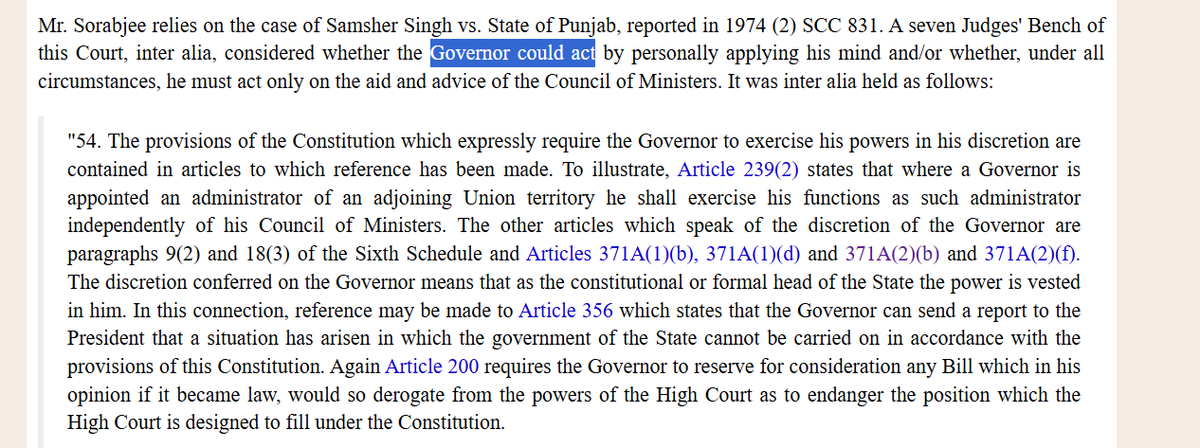
@rashtrapatibhvn Banerjee: there are discretionary powers always indicated and there are exceptional powers where also he can make discretion- 

Sr Adv Siddharth Luthra (for Haryana) supports the Union's arguments.
Sr Adv Mahesh Jethmalani(for Chhattisgarh): suplementing- militates against construction that proviso is necessarily attached to withholding assent- overwhelming support in constituent assembly which Dr Ambedkar said that discretion is not contrary to responsive governor.
Sr Adv Mahesh Jethmalani(for Chhattisgarh): suplementing- militates against construction that proviso is necessarily attached to withholding assent- overwhelming support in constituent assembly which Dr Ambedkar said that discretion is not contrary to responsive governor.
Jethmalani: TN judgment and Punjab judgment used proviso to place what is not there in main part. First part, which is substantive, prior to proviso, gives Governor three options- necessarily discretionary. in cabinet system of governor, the bills are laid at floors by the Government on principles of collective responsibility...what does it mean when it is said he withholds?...another word is rejecting the assent. He has option to assent, or rejecting it outright and when he has doubt regarding constitutionality or competence, he can reserve for President.
Attached of proviso to withholding of assent by two judgments- apart from construction and use of proviso to replace, it can be an entire exception to entire substantive part.
Attached of proviso to withholding of assent by two judgments- apart from construction and use of proviso to replace, it can be an entire exception to entire substantive part.
Jethmalani: words used in proviso are- governor 'may' -as far as substantive part is concerned, it uses shall- this means proviso is discretionary for the Governor. Next phrase in proviso is 'as soon as possible'- where timeline is used, it is for the legislator but when there is high constitutional functionaries are involved, there is no time lines.
Jethmalani: it is almost disrespectful to put timelines. For 'as soon as possible' Namburi held that if both houses were to pass a bill but Governor's assent is not given, the Bill does not lapse on dissolve- if you can pass a bill at leisure- it can languish for some time so then as soon as possible will be in conflict with substantive part
@rashtrapatibhvn Jethmalani: 'as soon as possible' after representation of bill'- he has not exercised withholding and that means it can't be necessarily attached to withholding assent.
@rashtrapatibhvn Jethmalani: proviso uses 'may', 'as soon as possible' and on 'presentation' -proviso does not follows substantive part.
I adopt the arguments of SG, Salve that justiciability does not arise certainity for the President.
I adopt the arguments of SG, Salve that justiciability does not arise certainity for the President.
Jethmalani: what is the remedy when assent is wrongly withheld? Article 32 is not the remedy because it is meant for fundamental rights violation. There may be remedy elsewhere, but not Article 32
J Narasimha: we are not considering Article 32 petition
Jethmalani: i am not advancing the argument what other remedies lie
J Narasimha: we are not considering Article 32 petition
Jethmalani: i am not advancing the argument what other remedies lie
@rashtrapatibhvn Jethmalani retierates that it should have been referred to five judge bench
CJI: we are not sitting in appeal
CJI: we are not sitting in appeal
@rashtrapatibhvn Sr Adv Vinay Navare: I will show five provisions which answers if the bill can be withheld even if it deals with State subject? Article 286, 253, 287, 202 r/w 203.
@rashtrapatibhvn Navare: how can in federalism structure President/Governor has some kind of fetter? Scrutiny shows if Article 201 is read in a way, it will affect these five provisions
@rashtrapatibhvn Navare: some popular view is that power is only for repugnancy, please look at Article 213- legislative power of governor.
@rashtrapatibhvn Navare: Article 213(1)(b) [(b) he would have deemed it necessary to reserve a Bill containing the same provisions for the consideration of the President; or] will have a reading when Article 200 is read in a way that Governor has discretion
@rashtrapatibhvn Navare: I don't say if the Governor sits on bill the court is powerless, but mandamus and timeline for highest constitutional authority-it should not be there
Navare: there are political solutions, for a democracy to be vibrant, its the expression of people's wise. Sorry to say, two or five person sitting to say I have the solution, it may not be vibrant.
CJI: bill passed by representatives of the people, will have to be given effect
SG Mehta: on maintainability of writ, Article 131 and 32, whether the Governor would like to invite? I will get the instructions today. If I argue, please then give me 20 minutes if I have to argue.
Sr Adv for Haryana: constitutional silences which need to be deferred to. Our courts have acknowledged, they are to be deferred to. In Narula's case, the prescription of disqualifcation, can it be done through judicial review? court said where there are constitutional silence, it needs to be deferred to.
CJI: bill passed by representatives of the people, will have to be given effect
SG Mehta: on maintainability of writ, Article 131 and 32, whether the Governor would like to invite? I will get the instructions today. If I argue, please then give me 20 minutes if I have to argue.
Sr Adv for Haryana: constitutional silences which need to be deferred to. Our courts have acknowledged, they are to be deferred to. In Narula's case, the prescription of disqualifcation, can it be done through judicial review? court said where there are constitutional silence, it needs to be deferred to.
@rashtrapatibhvn Sr Adv Guru Krishnakumar: please see the nature of functions they are performing. Where constitutional framers needed to add timelimit, they included in proviso.
@rashtrapatibhvn Krishnakumar: is there some concept of temporary withholding? it is incidental to withholding in the main part. how long is to long for the Governor to have not acted? in what situation the court draws a line?
@rashtrapatibhvn Arguments concluded for the side arguing in favour of the reference. Intervenors not allowed to argue.
• • •
Missing some Tweet in this thread? You can try to
force a refresh





